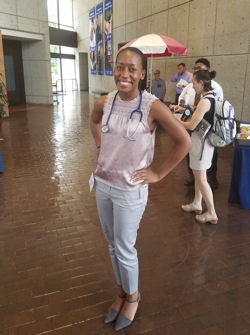November 2017, I lay down in the guest room of my mother's house. I was not in my usual bedroom but instead the stuffy room at the back of the house—the one that got too much sun in the middle of the day. I remember because I was sweating uncomfortably. In actuality, everything was uncomfortable. I had not showered; changed clothes; or left that hot, humid room in 3 days. My mother; my friends; and my school administrators had knocked, called, texted, and e-mailed. They all made it clear that their concern only grew with each day that I did not respond, and all I could muster up the energy to do was roll to the other less sweaty but no more comfortable side of the bed.
On day four of my hibernation, I dug deep within myself to drag the required reading text for the psychiatry module, Unholy Ghost: Writers on Depression, out of my backpack and climbed into my bed. It was the final module, after all, and I had made it this far into medical school. “I might not finish strong,” I thought to myself, “but, by golly, I will finish my first 2 years!” I huddled in my usual corner rehearsing my daily mantra—just get up, it's not that hard, all the other students are coping, what is wrong with you, you know people are dying in the world, how selfish can you be. Once those thoughts were silenced, I began to read. Immediately my eyes were drawn to these words by the poet Jane Hall: “I had to ask two times before my hand would scratch my ear.” I put down the book and wept. For the first time in what felt like months, I finally had the words to describe why I was no longer functioning as a medical student. It wasn't “sadness.” It wasn't “wallowing in self-pity.” Neither of those felt accurate, although many well-meaning individuals would label it as such. I cried because I could finally communicate to my mother and loved ones how I was feeling and finally give an explanation. As a patient, I could finally describe my chief symptom beyond the words, “I don't know.” I could communicate in very real terms how depression was taking a toll on my daily life: “I had to sit down for 10 minutes after brushing my teeth this morning because I felt completely drained.”
Even before starting medical school, I was warned by students, doctors, administrators, and family to stay grounded and balanced. Grounded and balanced. Both abstract concepts for someone who really appreciates clear instructions to accomplish tasks. So, here we are, 3 months later. I find myself able to complete projects, engage in conversation, and study for my exams. After receiving treatment and support, I can accomplish what I set out to do when I first arrived 18 months ago.
I encourage future medical students who, much like myself, may struggle with the reality that there are only 14 out of 132 faces that have the same color as mine; that national events like those that occurred in Charlottesville, Virginia, in August 2017 will be seen as a matter to be discussed in the black community and not openly discussed and denounced as hate speech by the medical community; that there will be days where you fall short, show up late, and make a below-average grade on the exam and that it is not a reflection of your race, intelligence, or self-worth. I encourage those medical students to please take care of yourself first and foremost. Whether doing so means reading the book on your shelf that you are saving for after the exam, treating yourself to that piece of cake, or going to the gym for an hour even though you haven't finished all the lectures. Because it takes a strong and healthy individual to get through this, and—more often than not—we as future caregivers and healers place the burdens and fights for justice and equality on our shoulders without making sure those shoulders are strong enough to take the weight.

Danielle Maegan Blemur
Emory University School of Medicine
Class of 2020
Back to the February 2020 issue of ACP IMpact

